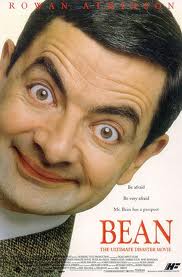What will be funny in Egypt? Well right now, not much perhaps but this question isn’t connected to current events unravelling in that part of the world. Rather, it is a guiding question that underpinned the making of the Mr Bean movie: What would be funny in Egypt? provided the creative platform to explore a comedy genre that would have wide appeal. It also represents smart thinking in a world that is more connected than ever before; a world that shares information more than ever before; and a world where thinking globally and acting locally goes beyond mere sloganeering.
The application of the, ‘what would be funny in Egypt?’ principle, is one that speaks to the ability to adapt; to see things  beyond the limitations of one’s own lens or paradigm. Often spoken and written about but a little more difficult when it comes to application. I recall two separate situations of doing work in China with two highly respected leadership (well one was more of a Coaching guru) experts and authors. On each occasion both presented material that was developed for an American context and market – understandable given that both were American. It was good stuff…in an American context. It was relevant…to an American context and audience. But this was China. My initial sense that something was badly amiss at the outset of their respective presentations turned to curious bemusement as I realized that neither of these esteemed Gurus was aware of just how incongruous was their content to the context. Of course in that part of the world ‘feedback’ takes on a different hue and so it was that they each blundered through their sessions none the wiser.
beyond the limitations of one’s own lens or paradigm. Often spoken and written about but a little more difficult when it comes to application. I recall two separate situations of doing work in China with two highly respected leadership (well one was more of a Coaching guru) experts and authors. On each occasion both presented material that was developed for an American context and market – understandable given that both were American. It was good stuff…in an American context. It was relevant…to an American context and audience. But this was China. My initial sense that something was badly amiss at the outset of their respective presentations turned to curious bemusement as I realized that neither of these esteemed Gurus was aware of just how incongruous was their content to the context. Of course in that part of the world ‘feedback’ takes on a different hue and so it was that they each blundered through their sessions none the wiser.
It forced me to a deeper questioning of what it means to have ‘principles’ (in this case leadership principles) in a world that is diverse and where the context differs widely. It revealed in stark contrast the ‘arrogance’ of believing that what worked in one set of circumstances would, without thinking, apply universally. Each of these gentlemen should have know better. Each should have displayed more sensitivity but I suspect they had become to believe their own press and over time, that can prove deadly. For both it was their first visit to China and it appeared that neither had done much thinking or work concerning the context and what it would take for their message to find meaningful traction in this unfamiliar context. It was a challenge beyond mere translation – it went deeper than that. I think it all points to being a learner. Authentic Learners hold lightly to their theories and remain forever open to new ways of seeing; of doing; of thinking and ultimately, of being. Rosabeth Moss Kantor once said, “Leaders are more powerful role models by their learning than their teaching”. There is something profound by that insight. Neither of the folk I am talking about appeared to arrive with questions; they rode into town, guns blazing, full of answers and confident that they were right in both assumption and theory.
What would be funny in Egypt? It is a good question to be asking not just once but every time you find yourself in a different context. It is a question that will require adaptation and perhaps letting go some of those things you would rather hold onto. It is a question that will allow you to explore, learn and grow. It also might just be a question that means you succeed when you might have failed. Maybe there is something we should take more seriously when it comes to Mr Bean!


